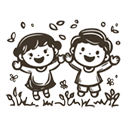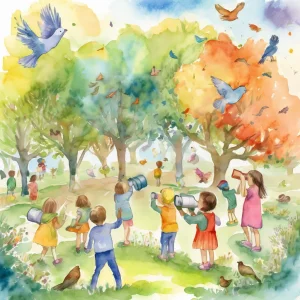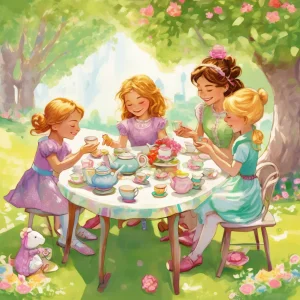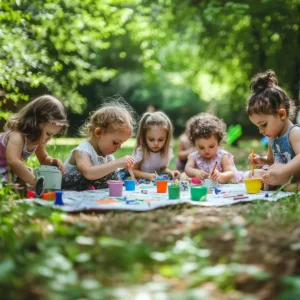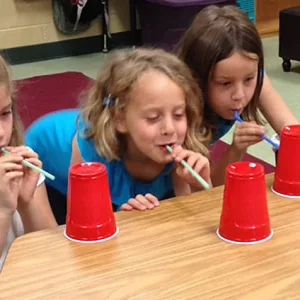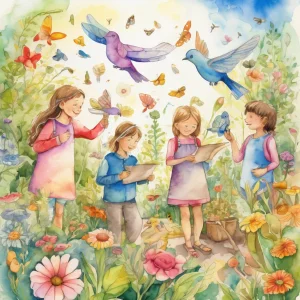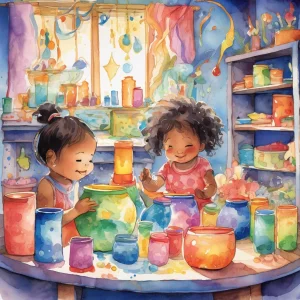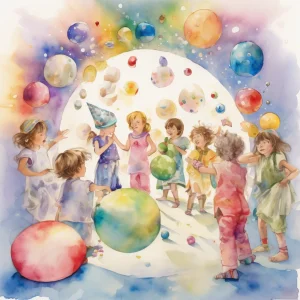Activity
Similar Activities
Picnic Adventure: Pretend Cooking Play for Toddlers
Children’s Age: 2–3 years
Activity Duration: 10 – 30 minutes
An imaginative activity where children (ages 2-3) engage in pretend cooking during a picnic adventure.
Activity Duration: 10 – 30 minutes
Nature Shapes Adventure: Bird Watch & Scavenger Hunt
Children’s Age: 4–5 years
Activity Duration: 10 minutes
An outdoor activity for children aged 4-5 years combining bird watching and shape recognition.
Activity Duration: 10 minutes
Musical Freeze Painting: A Creative Dance Adventure
Children’s Age: 3 years
Activity Duration: 10 – 20 minutes
An engaging activity combining painting with musical freeze dance to promote creativity and play skills.
Activity Duration: 10 – 20 minutes
Enchanted Tea Party Adventure: A Magical Journey
Children’s Age: 3 years
Activity Duration: 10 – 15 minutes
Join us for a Magical Tea Party Adventure! Enhance your child's play skills, social-emotional growth, and language abilities through a whimsical tea party experience. Gather teacup…
Activity Duration: 10 – 15 minutes
Outdoor Tea Party and Fix-it Fun for Toddlers
Children’s Age: 2–4 years
Activity Duration: 10 – 25 minutes
Let's create a fun Outdoor Tea Party and Fix-it Station for kids aged 1 to 3. Set up a table and chairs, play tea set, pretend tools, household items for fixing, a picnic blanket, …
Activity Duration: 10 – 25 minutes
Whimsical Cup Blow Race for Kids
Children’s Age: 4–6 years
Activity Duration: 5 – 10 minutes
The Cup Race Challenge activity is designed to boost teamwork, fine motor skills, and problem-solving in children. You'll need plastic cups, straws, a table, and masking tape to cr…
Activity Duration: 5 – 10 minutes
Enchanted Coding Adventure Storytelling with Imagination
Children’s Age: 10–12 years
Activity Duration: 45 minutes
The "Coding Adventure Storytelling" activity is tailored for children aged 10-12 to enhance empathy, play skills, language abilities, and introduce basic programming concepts in a …
Activity Duration: 45 minutes
Enchanted Forest: Nature's Treasure Hunt Adventure
Children’s Age: 11–15 years
Activity Duration: 30 – 45 minutes
Explore the wonders of the outdoors with "Nature's Treasure Hunt," a fun and educational activity for children. This outdoor adventure boosts play skills, academic knowledge, and s…
Activity Duration: 30 – 45 minutes
Enchanted Musical Storytime Adventure: A Journey Through Sound
Children’s Age: 2–3 years
Activity Duration: 10 minutes
"Musical Storytime Adventure" is a delightful activity designed for children aged 24 to 36 months to enjoy a fun and educational experience. Set up by gathering picture books and c…
Activity Duration: 10 minutes
Melodies of Creation: The Musical Painting Adventure
Children’s Age: 2–3 years
Activity Duration: 15 minutes
Engage children aged 24 to 36 months in the Musical Painting activity, promoting creativity and motor development. Provide paper, paints, musical instruments, and lively music for …
Activity Duration: 15 minutes
Colorful Sorting Fun: Exploring Colors and Shapes
Children’s Age: 1.5–2 years
Activity Duration: 5 – 10 minutes
"Colorful Sorting Fun" is an engaging activity designed for children aged 18 to 24 months to boost their fine motor skills, cognitive abilities, and color recognition. Prepare colo…
Activity Duration: 5 – 10 minutes
Imaginary Adventures: Mini Bowling Feelings Story Game
Children’s Age: 2–5 years
Activity Duration: 10 minutes
An engaging activity promoting sensory development, creativity, reading, and storytelling.
Activity Duration: 10 minutes





